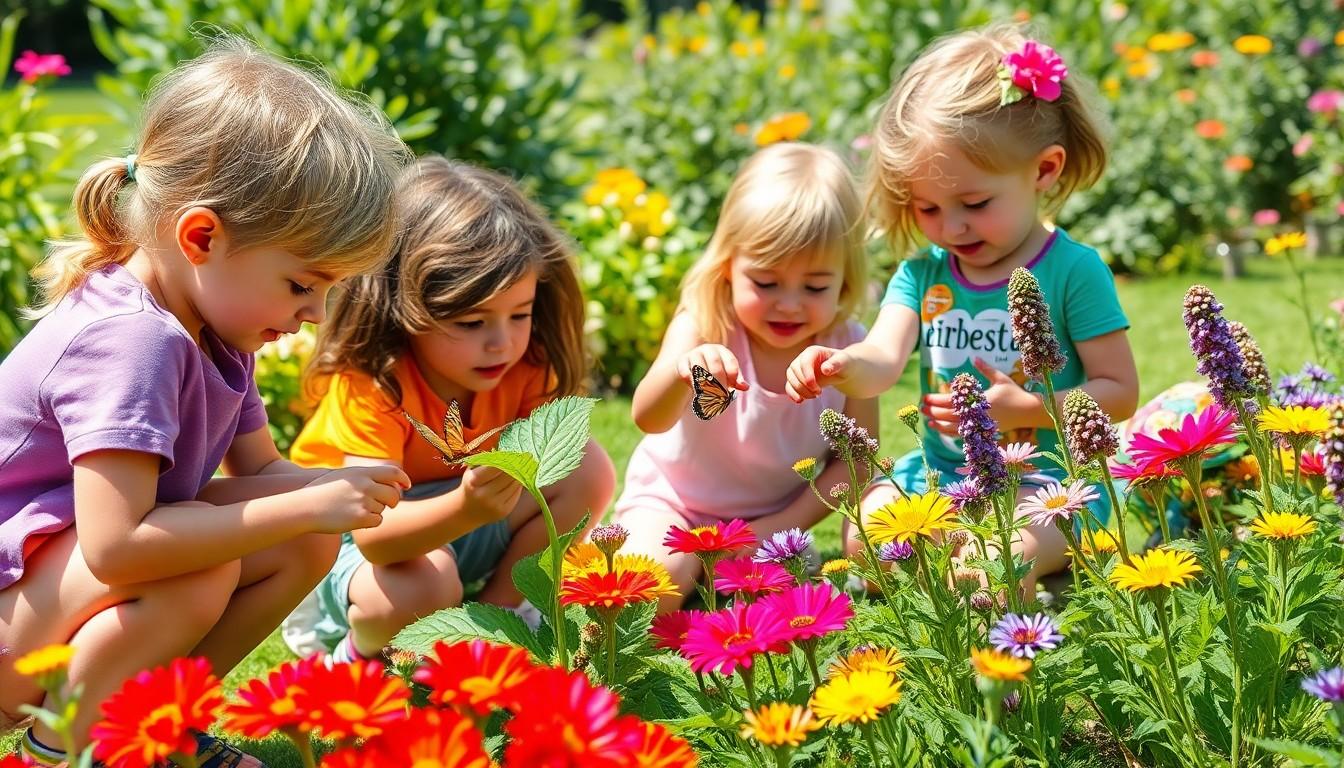The Best Fluffy Pancakes recipe you will fall in love with. Full of tips and tricks to help you make the best pancakes.

When it comes to preschoolers, the great outdoors is like a magical playground waiting to be explored. Imagine little ones running wild, giggling as they discover nature’s wonders, and burning off that never-ending energy. Outdoor activities aren’t just fun; they’re essential for young minds and bodies. Who knew that chasing butterflies could be a stepping stone to developing coordination and social skills?
From nature scavenger hunts to muddy puddle jumping, preschool outdoor activities spark creativity and curiosity. They offer a perfect blend of learning and laughter, ensuring kids absorb valuable lessons while having a blast. So, let’s dive into the world of outdoor adventures that promise to keep those tiny feet moving and those bright minds engaged. After all, who wouldn’t want to trade a classroom for a sunlit field?
Preschool Outdoor Activities
Outdoor activities hold significant importance for preschoolers. They enhance overall development and facilitate learning in a natural environment.
Physical Development Benefits
Engaging in outdoor activities promotes physical development. Children improve motor skills through running, jumping, and climbing. Activities like ball games build coordination and strength. These experiences also help increase stamina and enhance balance. Participating in play allows preschoolers to engage large muscle groups, which is essential for growth. Exposure to different terrains fosters agility, encouraging them to explore new physical challenges. Outdoor play enables children to experience risk in a controlled setting, aiding in developing confidence in their physical abilities.
Cognitive Development Benefits
Cognitive development benefits from outdoor play through hands-on learning experiences. Children actively explore their environment, prompting curiosity and critical thinking. Nature-based activities, such as scavenger hunts, stimulate problem-solving skills. Observing and interacting with natural elements fosters scientific reasoning. Engaging in imaginative play outdoors enhances creativity. Furthermore, outdoor settings encourage language development through social interaction. As children describe their discoveries, they expand their vocabulary and communication skills. This ongoing engagement with nature helps build foundational concepts related to the world around them.
Types Of Preschool Outdoor Activities

Outdoor activities for preschoolers encompass a variety of experiences that support development. Engaging in different types of play enhances physical and cognitive skills while promoting social interaction.
Nature Exploration
Nature exploration encourages preschoolers to interact directly with their environment. Activities include nature walks, where children observe plants and wildlife, fostering curiosity about nature. Scavenger hunts enhance observation skills, prompting children to find specific leaves, rocks, or insects. Discovering textures and colors in nature boosts sensory awareness. Gardening projects allow kids to plant seeds and learn about growth, patience, and responsibility. Participation in these activities nurtures a love for the outdoors and ignites a sense of adventure.
Creative Play Spaces
Creative play spaces stimulate imagination and collaboration among preschoolers. Outdoor art stations invite children to paint with natural materials, like leaves and twigs, encouraging artistic expression. Building with large blocks or natural materials, such as stones and logs, promotes teamwork and problem-solving. Designated areas for pretend play, like a playhouse or market, allow children to role-play and develop social skills. Incorporating music with instruments made from recycled items fosters a fun and engaging atmosphere. These creative spaces inspire exploration and innovation in a vibrant outdoor setting.
Safety Considerations For Outdoor Activities
Safety is essential during preschool outdoor activities. Adequate precautions help create a secure environment where children can explore.
Supervision Guidelines
Constant supervision is crucial for preschool outdoor activities. An adult should be present at all times, ensuring that children engage in activities safely. Small groups allow for better monitoring, as caregivers can facilitate play while keeping an eye on each child. Regular headcounts help maintain awareness of each child’s location. Moreover, adults must be trained in first aid and emergency procedures, ready to respond if accidents occur. Listening to children’s needs and observing their play can help identify potential hazards.
Safety Gear Recommendations
Appropriate safety gear enhances protection during outdoor play. Helmets are essential for biking or scooter riding, reducing head injury risks. Sun protection, including hats and sunscreen, prevents sunburns during long outdoor sessions. Proper footwear, such as sneakers or closed-toe shoes, protects feet from injuries while providing comfort. Additionally, children should wear age-appropriate gear for specific activities, such as life jackets for water-related play. Regularly inspecting equipment ensures it is safe and functional. Focusing on these aspects promotes a secure and enjoyable outdoor experience.
Engaging Preschool Outdoor Activities
Outdoor activities for preschoolers boost physical and social skills while stimulating creativity. Engaging in various outdoor play options helps children learn valuable lessons in teamwork and self-discovery.
Group Games And Team Building
Group games play a fundamental role in developing cooperation and communication. Activities like “Red Rover” and “Duck, Duck, Goose” encourage children to work together and follow rules. Gamifying play fosters a sense of belonging while promoting active participation among peers. Tag games, for instance, enhance running skills and agility while incorporating social interaction. Structured activities, such as relay races, build teamwork as children cheer each other on. Sharing responsibilities within teams nurtures friendships and encourages positive social dynamics among preschoolers.
Individual Activities And Exploration
Individual activities enhance self-reliance and decision-making skills. Nature scavenger hunts stand out as an excellent option for encouraging exploration. Children can search for leaves, rocks, or specific insects, which enhances observation skills. Gardening also provides opportunities for individual work, allowing them to care for plants and learn about responsibility. Art activities like painting with natural materials promote creativity while enabling personal expression. Free play in open spaces encourages children to explore their surroundings, fostering curiosity and independence. Each experience contributes to increased confidence and self-awareness as preschoolers engage in solo pursuits.
The Power of Outdoor Play
Embracing outdoor activities for preschoolers opens up a world of exploration and growth. These experiences not only enhance physical abilities but also foster creativity and social skills. By engaging with nature and participating in group games or individual projects, children develop essential life skills that lay the foundation for their future.
Safety is paramount in these adventures, ensuring that children can explore freely while remaining protected. With proper supervision and safety measures in place, outdoor play becomes a vital component of early childhood development. Encouraging outdoor activities is a powerful way to nurture well-rounded, confident, and curious young minds.
